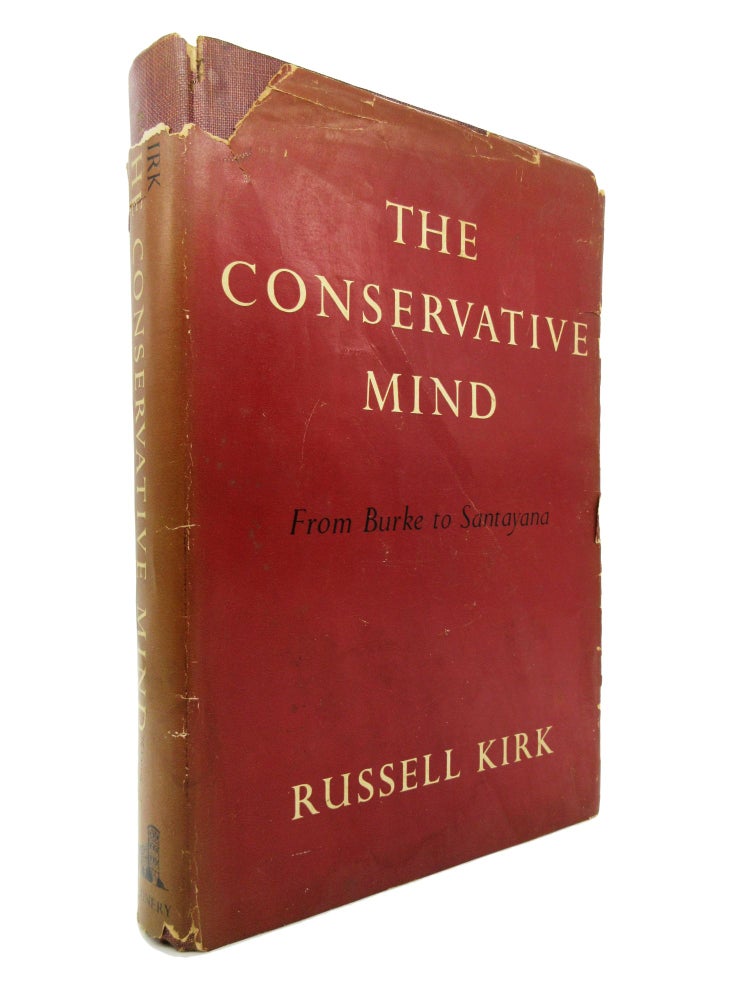
The Conservative Mind: From Burke to Santayana
Chicago: Henry Regnery Company, 1953. First US edition, second printing (August 1953). Octavo. Original maroon cloth and dust jacket (not price-clipped). Minor scuffing to board with chip to top of front hinge; minor foxing to pastedowns and free endpapers; edgewear to dust jacket, with chipping along folds and corners; large chip to head of dust jacket and spine, affecting name and title on spine, and to foot of spine; small closed tear to head of rear jacket panel with crease; spotting to dust jacket. Very good early printing of Kirk's masterpiece. Item #38
Second printing of Russell Kirk’s (1918–1994) landmark history of modern intellectual conservatism. When The Conservative Mind was first published in 1953 by the Henry Regnery Company in Chicago, a substantial literature had developed in opposition to (or, at least as a critique of) modern liberalism, including through the works of Albert J. Nock, James Burnham, T. S. Eliot, and Richard Weaver. What the literature seemed to lack, however, was a unifying concept, or guiding principle, capable of combining its many unique strands into a coherent tradition. As Henry Regnery affirmed in the book’s seventh revised edition, “it was the great achievement, one might even say the historic achievement, of Russell Kirk’s The Conservative Mind…to provide the needed unifying concept.” Although modern conservatism had existed prior to the publication of The Conservative Mind, it existed as a movement thereafter. Kirk—or, the “Sage of Mecosta,” as he was known to some—sought to present conservatism as a tradition relevant to our modern age, and he found this tradition embodied in the works, letters, and ideas of British and American statesmen (including Edmund Burke, John Adams, Alexander Hamilton, Fisher Ames, Joseph de Maistre, Benjamin Disraeli, and Alfred Balfour), and authors (including Samuel Taylor Coleridge, Alexis de Tocqueville, James Fenimore Cooper, Nathaniel Hawthorne, Robert Frost, and T. S. Eliot), and commentators (including John Henry Newman, Robert Nisbet, Paul Elmer Moore, and Irving Babbitt). For Kirk, the conservative “is reluctant to condense profound and intricate intellectual systems to a few pretentious phrases…Conservatism is not a fixed and immutable body of dogma, and conservatives inherit from Burke a talent for re-expressing their convictions to fit the times. As a working premise, nevertheless, one can observe…that the essence of social conservatism is preservation of the ancient moral traditions of humanity.” Kirk attempted to encapsulate this essence in his six canons of conservatism which, in abridged fashion, may be set forth as: (1) a belief in a transcendent order or natural law; (2) an affection for the variety and mystery of life; (3) a conviction that civilized society requires hierarchies; (4) a belief that freedom and property are closely connected; (5) a faith in prescription and distrust of those who would reconstruct society upon abstract designs; and (6) a recognition that change is not necessarily salutary reform (“hasty innovation may be a devouring conflagration, rather than a torch of progress”). Named by National Review as one of the top 100 non-fiction books of the twentieth century, The Conservative Mind is the defining statement of the intellectual conservative tradition.
Price: $250.00
